Peter Faber Business School ACCT300 Auditing of Funtastic Limited
VerifiedAdded on 2023/06/07
|10
|2129
|315
Report
AI Summary
This report analyzes the auditing of Funtastic Limited, an ASX-listed company, addressing key aspects of its financial health. It examines the need for an independent external audit performed by Grant Thornton, emphasizing the importance of credibility, re-verification, and fraud detection. The report assesses how Funtastic's audit process aligns with principles of stewardship and common good, detailing the provision of information regarding management remuneration, share-based payments, and environmental regulations. It also evaluates the ethical issues associated with tight Key Performance Indicators (KPIs) for sales, highlighting potential pressures and unethical practices. Furthermore, the report includes a ratio analysis of Funtastic's financial performance, discussing liquidity, profitability, and leverage ratios, and raising concerns about the company's financial standing. The report concludes by emphasizing the critical role of auditing in ensuring the long-term viability of the organization and the need for management to address the identified financial issues.

Running Head: AUDITING
AUDITING
Name of the Student
Name of the University
Author note
AUDITING
Name of the Student
Name of the University
Author note
Paraphrase This Document
Need a fresh take? Get an instant paraphrase of this document with our AI Paraphraser
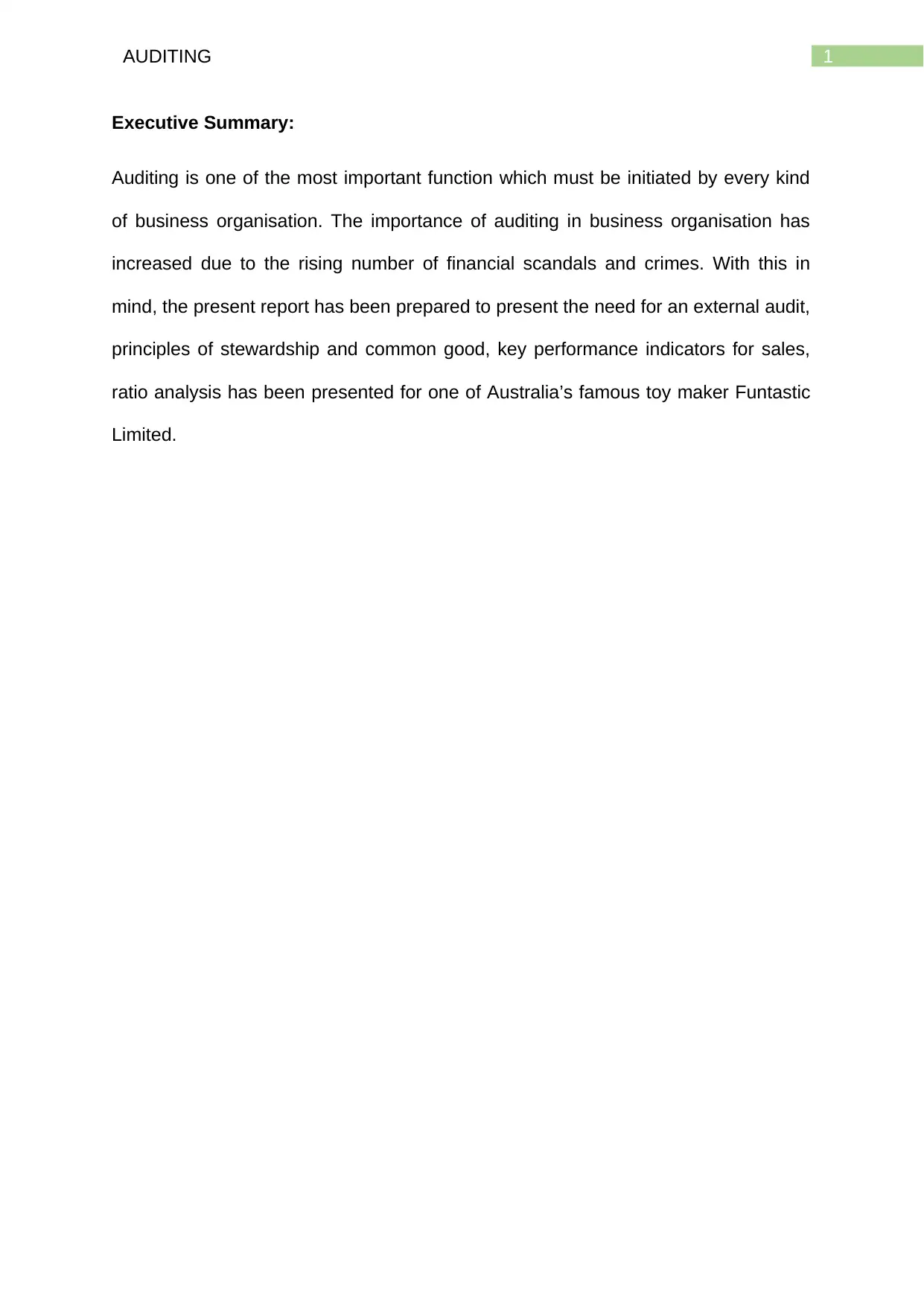
1AUDITING
Executive Summary:
Auditing is one of the most important function which must be initiated by every kind
of business organisation. The importance of auditing in business organisation has
increased due to the rising number of financial scandals and crimes. With this in
mind, the present report has been prepared to present the need for an external audit,
principles of stewardship and common good, key performance indicators for sales,
ratio analysis has been presented for one of Australia’s famous toy maker Funtastic
Limited.
Executive Summary:
Auditing is one of the most important function which must be initiated by every kind
of business organisation. The importance of auditing in business organisation has
increased due to the rising number of financial scandals and crimes. With this in
mind, the present report has been prepared to present the need for an external audit,
principles of stewardship and common good, key performance indicators for sales,
ratio analysis has been presented for one of Australia’s famous toy maker Funtastic
Limited.
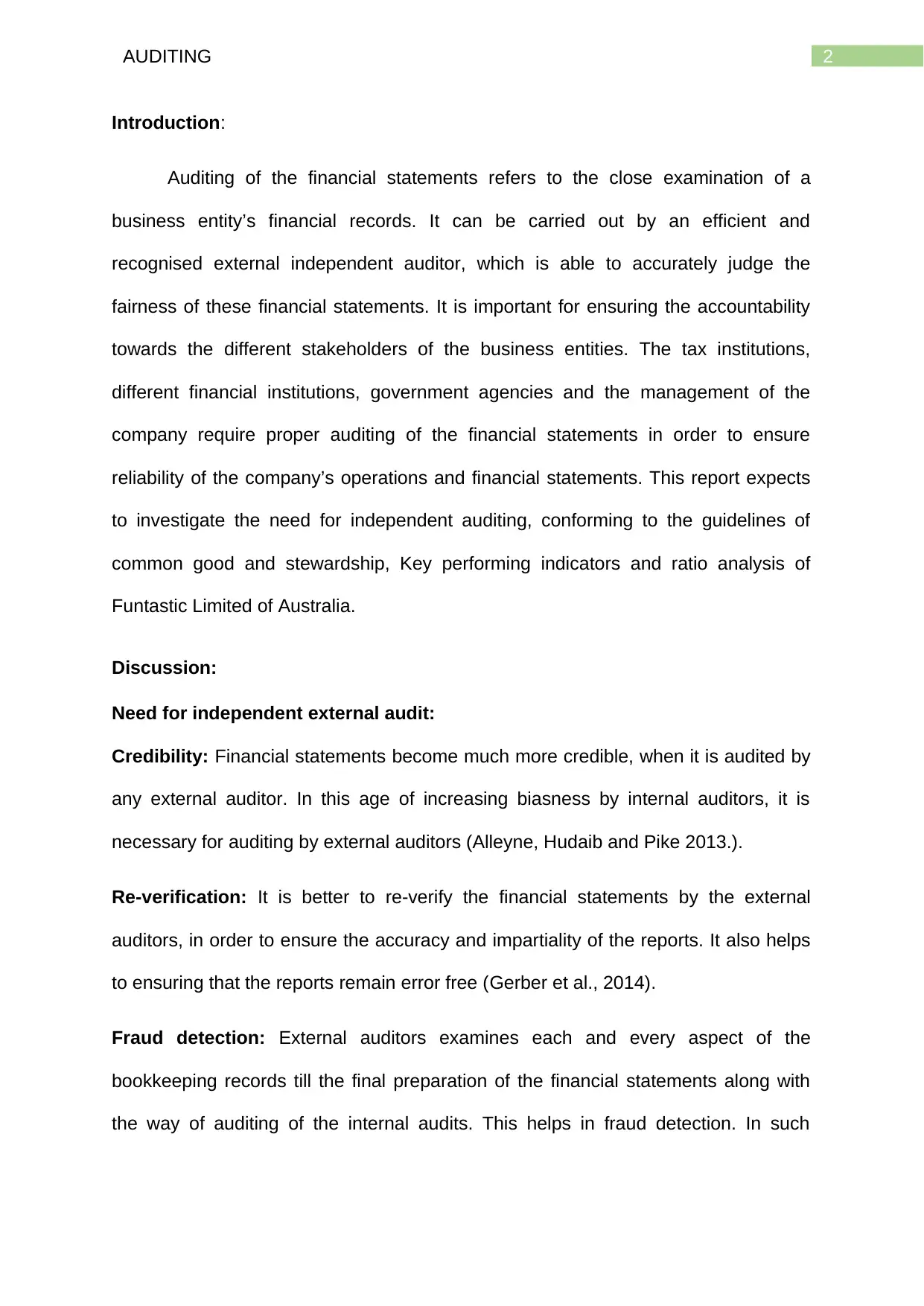
2AUDITING
Introduction:
Auditing of the financial statements refers to the close examination of a
business entity’s financial records. It can be carried out by an efficient and
recognised external independent auditor, which is able to accurately judge the
fairness of these financial statements. It is important for ensuring the accountability
towards the different stakeholders of the business entities. The tax institutions,
different financial institutions, government agencies and the management of the
company require proper auditing of the financial statements in order to ensure
reliability of the company’s operations and financial statements. This report expects
to investigate the need for independent auditing, conforming to the guidelines of
common good and stewardship, Key performing indicators and ratio analysis of
Funtastic Limited of Australia.
Discussion:
Need for independent external audit:
Credibility: Financial statements become much more credible, when it is audited by
any external auditor. In this age of increasing biasness by internal auditors, it is
necessary for auditing by external auditors (Alleyne, Hudaib and Pike 2013.).
Re-verification: It is better to re-verify the financial statements by the external
auditors, in order to ensure the accuracy and impartiality of the reports. It also helps
to ensuring that the reports remain error free (Gerber et al., 2014).
Fraud detection: External auditors examines each and every aspect of the
bookkeeping records till the final preparation of the financial statements along with
the way of auditing of the internal audits. This helps in fraud detection. In such
Introduction:
Auditing of the financial statements refers to the close examination of a
business entity’s financial records. It can be carried out by an efficient and
recognised external independent auditor, which is able to accurately judge the
fairness of these financial statements. It is important for ensuring the accountability
towards the different stakeholders of the business entities. The tax institutions,
different financial institutions, government agencies and the management of the
company require proper auditing of the financial statements in order to ensure
reliability of the company’s operations and financial statements. This report expects
to investigate the need for independent auditing, conforming to the guidelines of
common good and stewardship, Key performing indicators and ratio analysis of
Funtastic Limited of Australia.
Discussion:
Need for independent external audit:
Credibility: Financial statements become much more credible, when it is audited by
any external auditor. In this age of increasing biasness by internal auditors, it is
necessary for auditing by external auditors (Alleyne, Hudaib and Pike 2013.).
Re-verification: It is better to re-verify the financial statements by the external
auditors, in order to ensure the accuracy and impartiality of the reports. It also helps
to ensuring that the reports remain error free (Gerber et al., 2014).
Fraud detection: External auditors examines each and every aspect of the
bookkeeping records till the final preparation of the financial statements along with
the way of auditing of the internal audits. This helps in fraud detection. In such
⊘ This is a preview!⊘
Do you want full access?
Subscribe today to unlock all pages.

Trusted by 1+ million students worldwide
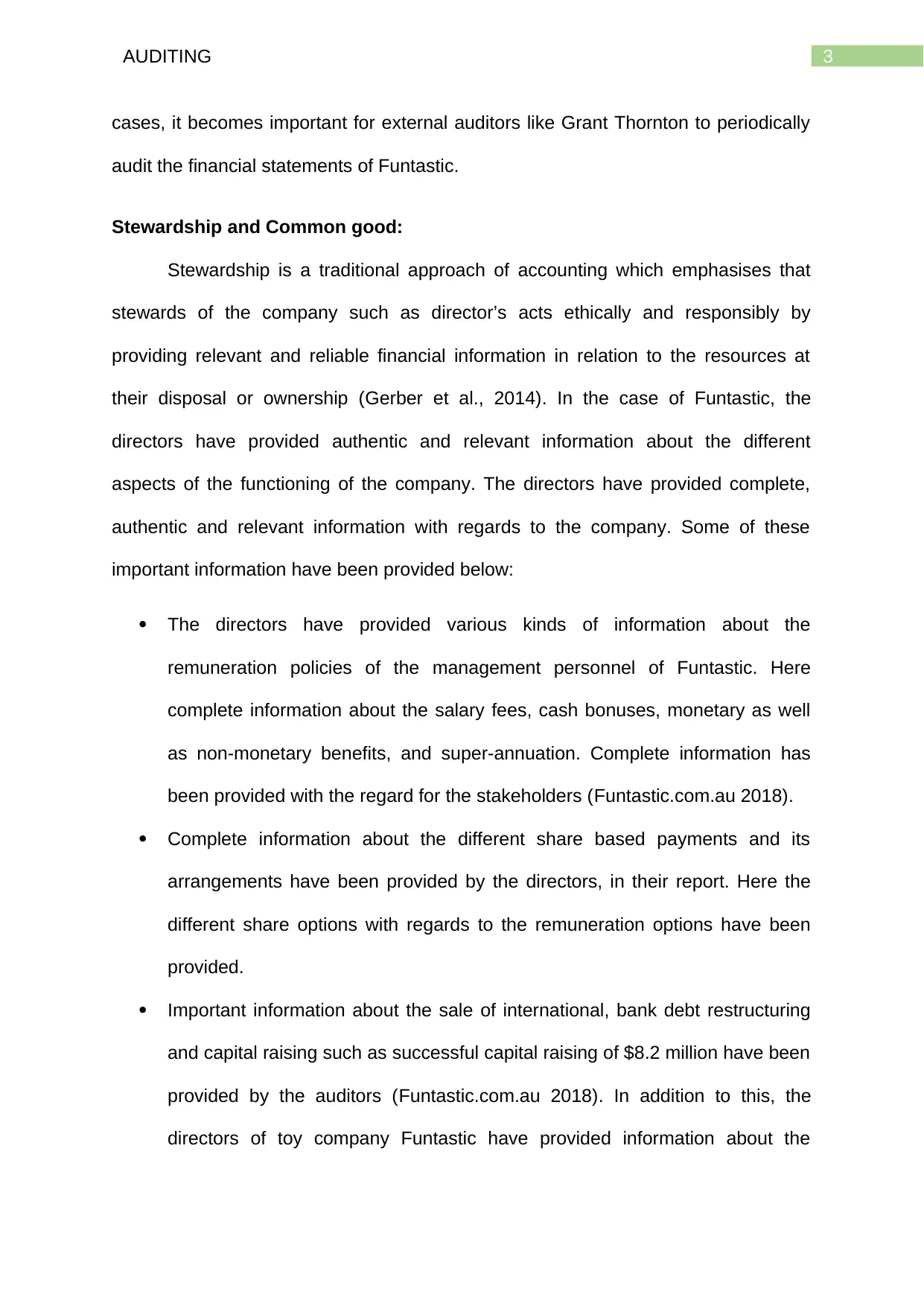
3AUDITING
cases, it becomes important for external auditors like Grant Thornton to periodically
audit the financial statements of Funtastic.
Stewardship and Common good:
Stewardship is a traditional approach of accounting which emphasises that
stewards of the company such as director’s acts ethically and responsibly by
providing relevant and reliable financial information in relation to the resources at
their disposal or ownership (Gerber et al., 2014). In the case of Funtastic, the
directors have provided authentic and relevant information about the different
aspects of the functioning of the company. The directors have provided complete,
authentic and relevant information with regards to the company. Some of these
important information have been provided below:
The directors have provided various kinds of information about the
remuneration policies of the management personnel of Funtastic. Here
complete information about the salary fees, cash bonuses, monetary as well
as non-monetary benefits, and super-annuation. Complete information has
been provided with the regard for the stakeholders (Funtastic.com.au 2018).
Complete information about the different share based payments and its
arrangements have been provided by the directors, in their report. Here the
different share options with regards to the remuneration options have been
provided.
Important information about the sale of international, bank debt restructuring
and capital raising such as successful capital raising of $8.2 million have been
provided by the auditors (Funtastic.com.au 2018). In addition to this, the
directors of toy company Funtastic have provided information about the
cases, it becomes important for external auditors like Grant Thornton to periodically
audit the financial statements of Funtastic.
Stewardship and Common good:
Stewardship is a traditional approach of accounting which emphasises that
stewards of the company such as director’s acts ethically and responsibly by
providing relevant and reliable financial information in relation to the resources at
their disposal or ownership (Gerber et al., 2014). In the case of Funtastic, the
directors have provided authentic and relevant information about the different
aspects of the functioning of the company. The directors have provided complete,
authentic and relevant information with regards to the company. Some of these
important information have been provided below:
The directors have provided various kinds of information about the
remuneration policies of the management personnel of Funtastic. Here
complete information about the salary fees, cash bonuses, monetary as well
as non-monetary benefits, and super-annuation. Complete information has
been provided with the regard for the stakeholders (Funtastic.com.au 2018).
Complete information about the different share based payments and its
arrangements have been provided by the directors, in their report. Here the
different share options with regards to the remuneration options have been
provided.
Important information about the sale of international, bank debt restructuring
and capital raising such as successful capital raising of $8.2 million have been
provided by the auditors (Funtastic.com.au 2018). In addition to this, the
directors of toy company Funtastic have provided information about the
Paraphrase This Document
Need a fresh take? Get an instant paraphrase of this document with our AI Paraphraser
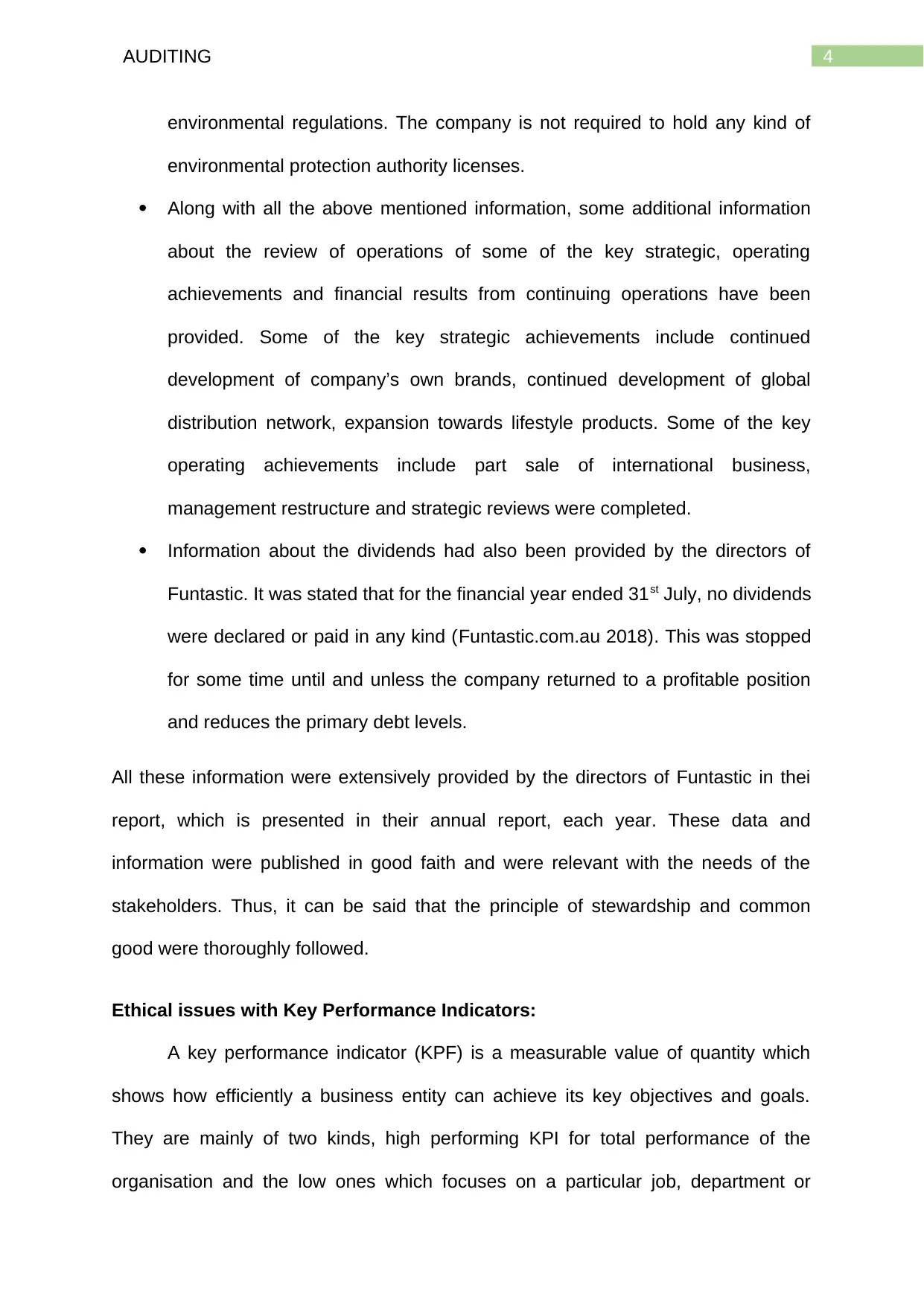
4AUDITING
environmental regulations. The company is not required to hold any kind of
environmental protection authority licenses.
Along with all the above mentioned information, some additional information
about the review of operations of some of the key strategic, operating
achievements and financial results from continuing operations have been
provided. Some of the key strategic achievements include continued
development of company’s own brands, continued development of global
distribution network, expansion towards lifestyle products. Some of the key
operating achievements include part sale of international business,
management restructure and strategic reviews were completed.
Information about the dividends had also been provided by the directors of
Funtastic. It was stated that for the financial year ended 31st July, no dividends
were declared or paid in any kind (Funtastic.com.au 2018). This was stopped
for some time until and unless the company returned to a profitable position
and reduces the primary debt levels.
All these information were extensively provided by the directors of Funtastic in thei
report, which is presented in their annual report, each year. These data and
information were published in good faith and were relevant with the needs of the
stakeholders. Thus, it can be said that the principle of stewardship and common
good were thoroughly followed.
Ethical issues with Key Performance Indicators:
A key performance indicator (KPF) is a measurable value of quantity which
shows how efficiently a business entity can achieve its key objectives and goals.
They are mainly of two kinds, high performing KPI for total performance of the
organisation and the low ones which focuses on a particular job, department or
environmental regulations. The company is not required to hold any kind of
environmental protection authority licenses.
Along with all the above mentioned information, some additional information
about the review of operations of some of the key strategic, operating
achievements and financial results from continuing operations have been
provided. Some of the key strategic achievements include continued
development of company’s own brands, continued development of global
distribution network, expansion towards lifestyle products. Some of the key
operating achievements include part sale of international business,
management restructure and strategic reviews were completed.
Information about the dividends had also been provided by the directors of
Funtastic. It was stated that for the financial year ended 31st July, no dividends
were declared or paid in any kind (Funtastic.com.au 2018). This was stopped
for some time until and unless the company returned to a profitable position
and reduces the primary debt levels.
All these information were extensively provided by the directors of Funtastic in thei
report, which is presented in their annual report, each year. These data and
information were published in good faith and were relevant with the needs of the
stakeholders. Thus, it can be said that the principle of stewardship and common
good were thoroughly followed.
Ethical issues with Key Performance Indicators:
A key performance indicator (KPF) is a measurable value of quantity which
shows how efficiently a business entity can achieve its key objectives and goals.
They are mainly of two kinds, high performing KPI for total performance of the
organisation and the low ones which focuses on a particular job, department or
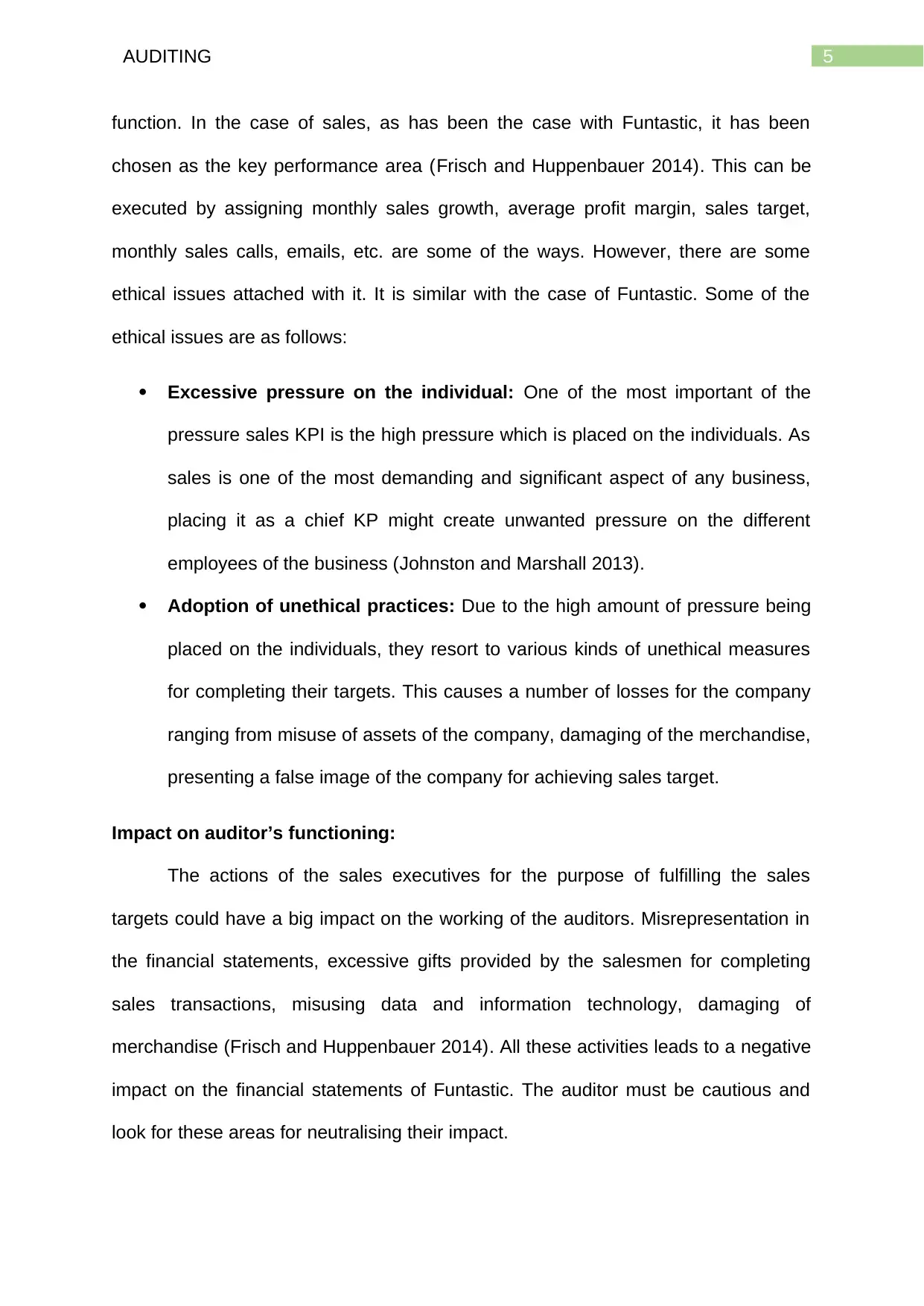
5AUDITING
function. In the case of sales, as has been the case with Funtastic, it has been
chosen as the key performance area (Frisch and Huppenbauer 2014). This can be
executed by assigning monthly sales growth, average profit margin, sales target,
monthly sales calls, emails, etc. are some of the ways. However, there are some
ethical issues attached with it. It is similar with the case of Funtastic. Some of the
ethical issues are as follows:
Excessive pressure on the individual: One of the most important of the
pressure sales KPI is the high pressure which is placed on the individuals. As
sales is one of the most demanding and significant aspect of any business,
placing it as a chief KP might create unwanted pressure on the different
employees of the business (Johnston and Marshall 2013).
Adoption of unethical practices: Due to the high amount of pressure being
placed on the individuals, they resort to various kinds of unethical measures
for completing their targets. This causes a number of losses for the company
ranging from misuse of assets of the company, damaging of the merchandise,
presenting a false image of the company for achieving sales target.
Impact on auditor’s functioning:
The actions of the sales executives for the purpose of fulfilling the sales
targets could have a big impact on the working of the auditors. Misrepresentation in
the financial statements, excessive gifts provided by the salesmen for completing
sales transactions, misusing data and information technology, damaging of
merchandise (Frisch and Huppenbauer 2014). All these activities leads to a negative
impact on the financial statements of Funtastic. The auditor must be cautious and
look for these areas for neutralising their impact.
function. In the case of sales, as has been the case with Funtastic, it has been
chosen as the key performance area (Frisch and Huppenbauer 2014). This can be
executed by assigning monthly sales growth, average profit margin, sales target,
monthly sales calls, emails, etc. are some of the ways. However, there are some
ethical issues attached with it. It is similar with the case of Funtastic. Some of the
ethical issues are as follows:
Excessive pressure on the individual: One of the most important of the
pressure sales KPI is the high pressure which is placed on the individuals. As
sales is one of the most demanding and significant aspect of any business,
placing it as a chief KP might create unwanted pressure on the different
employees of the business (Johnston and Marshall 2013).
Adoption of unethical practices: Due to the high amount of pressure being
placed on the individuals, they resort to various kinds of unethical measures
for completing their targets. This causes a number of losses for the company
ranging from misuse of assets of the company, damaging of the merchandise,
presenting a false image of the company for achieving sales target.
Impact on auditor’s functioning:
The actions of the sales executives for the purpose of fulfilling the sales
targets could have a big impact on the working of the auditors. Misrepresentation in
the financial statements, excessive gifts provided by the salesmen for completing
sales transactions, misusing data and information technology, damaging of
merchandise (Frisch and Huppenbauer 2014). All these activities leads to a negative
impact on the financial statements of Funtastic. The auditor must be cautious and
look for these areas for neutralising their impact.
⊘ This is a preview!⊘
Do you want full access?
Subscribe today to unlock all pages.

Trusted by 1+ million students worldwide
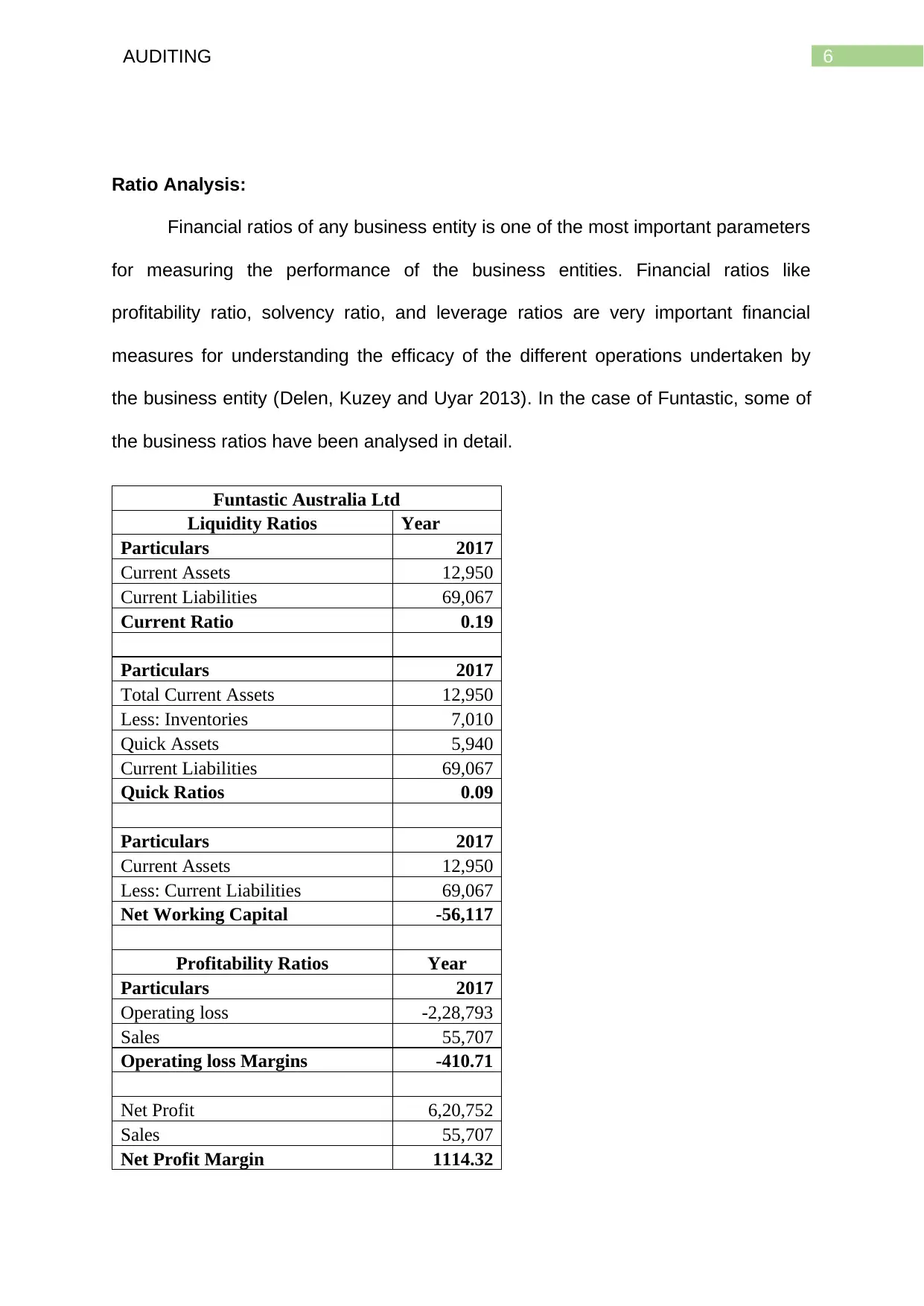
6AUDITING
Ratio Analysis:
Financial ratios of any business entity is one of the most important parameters
for measuring the performance of the business entities. Financial ratios like
profitability ratio, solvency ratio, and leverage ratios are very important financial
measures for understanding the efficacy of the different operations undertaken by
the business entity (Delen, Kuzey and Uyar 2013). In the case of Funtastic, some of
the business ratios have been analysed in detail.
Funtastic Australia Ltd
Liquidity Ratios Year
Particulars 2017
Current Assets 12,950
Current Liabilities 69,067
Current Ratio 0.19
Particulars 2017
Total Current Assets 12,950
Less: Inventories 7,010
Quick Assets 5,940
Current Liabilities 69,067
Quick Ratios 0.09
Particulars 2017
Current Assets 12,950
Less: Current Liabilities 69,067
Net Working Capital -56,117
Profitability Ratios Year
Particulars 2017
Operating loss -2,28,793
Sales 55,707
Operating loss Margins -410.71
Net Profit 6,20,752
Sales 55,707
Net Profit Margin 1114.32
Ratio Analysis:
Financial ratios of any business entity is one of the most important parameters
for measuring the performance of the business entities. Financial ratios like
profitability ratio, solvency ratio, and leverage ratios are very important financial
measures for understanding the efficacy of the different operations undertaken by
the business entity (Delen, Kuzey and Uyar 2013). In the case of Funtastic, some of
the business ratios have been analysed in detail.
Funtastic Australia Ltd
Liquidity Ratios Year
Particulars 2017
Current Assets 12,950
Current Liabilities 69,067
Current Ratio 0.19
Particulars 2017
Total Current Assets 12,950
Less: Inventories 7,010
Quick Assets 5,940
Current Liabilities 69,067
Quick Ratios 0.09
Particulars 2017
Current Assets 12,950
Less: Current Liabilities 69,067
Net Working Capital -56,117
Profitability Ratios Year
Particulars 2017
Operating loss -2,28,793
Sales 55,707
Operating loss Margins -410.71
Net Profit 6,20,752
Sales 55,707
Net Profit Margin 1114.32
Paraphrase This Document
Need a fresh take? Get an instant paraphrase of this document with our AI Paraphraser
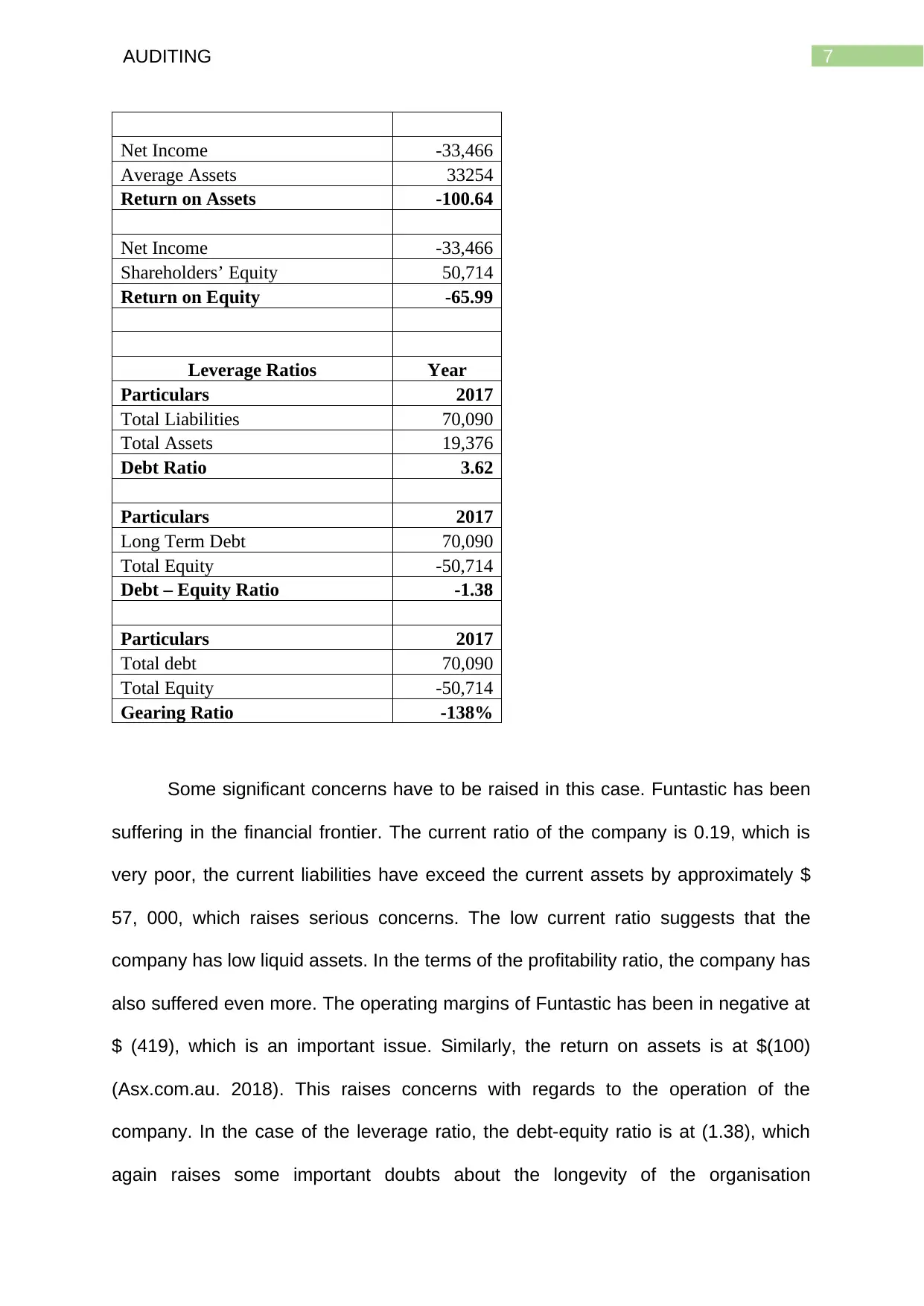
7AUDITING
Net Income -33,466
Average Assets 33254
Return on Assets -100.64
Net Income -33,466
Shareholders’ Equity 50,714
Return on Equity -65.99
Leverage Ratios Year
Particulars 2017
Total Liabilities 70,090
Total Assets 19,376
Debt Ratio 3.62
Particulars 2017
Long Term Debt 70,090
Total Equity -50,714
Debt – Equity Ratio -1.38
Particulars 2017
Total debt 70,090
Total Equity -50,714
Gearing Ratio -138%
Some significant concerns have to be raised in this case. Funtastic has been
suffering in the financial frontier. The current ratio of the company is 0.19, which is
very poor, the current liabilities have exceed the current assets by approximately $
57, 000, which raises serious concerns. The low current ratio suggests that the
company has low liquid assets. In the terms of the profitability ratio, the company has
also suffered even more. The operating margins of Funtastic has been in negative at
$ (419), which is an important issue. Similarly, the return on assets is at $(100)
(Asx.com.au. 2018). This raises concerns with regards to the operation of the
company. In the case of the leverage ratio, the debt-equity ratio is at (1.38), which
again raises some important doubts about the longevity of the organisation
Net Income -33,466
Average Assets 33254
Return on Assets -100.64
Net Income -33,466
Shareholders’ Equity 50,714
Return on Equity -65.99
Leverage Ratios Year
Particulars 2017
Total Liabilities 70,090
Total Assets 19,376
Debt Ratio 3.62
Particulars 2017
Long Term Debt 70,090
Total Equity -50,714
Debt – Equity Ratio -1.38
Particulars 2017
Total debt 70,090
Total Equity -50,714
Gearing Ratio -138%
Some significant concerns have to be raised in this case. Funtastic has been
suffering in the financial frontier. The current ratio of the company is 0.19, which is
very poor, the current liabilities have exceed the current assets by approximately $
57, 000, which raises serious concerns. The low current ratio suggests that the
company has low liquid assets. In the terms of the profitability ratio, the company has
also suffered even more. The operating margins of Funtastic has been in negative at
$ (419), which is an important issue. Similarly, the return on assets is at $(100)
(Asx.com.au. 2018). This raises concerns with regards to the operation of the
company. In the case of the leverage ratio, the debt-equity ratio is at (1.38), which
again raises some important doubts about the longevity of the organisation
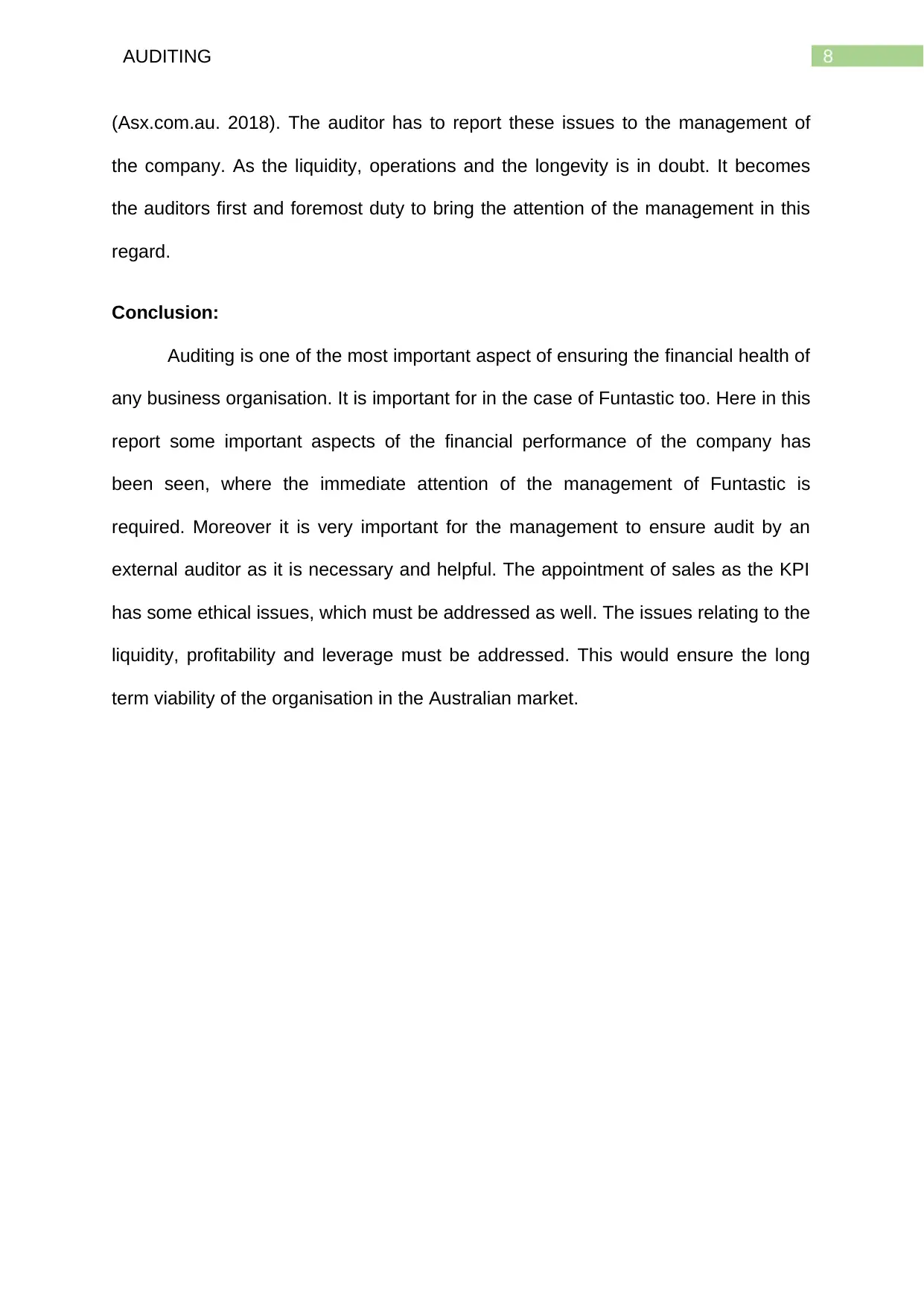
8AUDITING
(Asx.com.au. 2018). The auditor has to report these issues to the management of
the company. As the liquidity, operations and the longevity is in doubt. It becomes
the auditors first and foremost duty to bring the attention of the management in this
regard.
Conclusion:
Auditing is one of the most important aspect of ensuring the financial health of
any business organisation. It is important for in the case of Funtastic too. Here in this
report some important aspects of the financial performance of the company has
been seen, where the immediate attention of the management of Funtastic is
required. Moreover it is very important for the management to ensure audit by an
external auditor as it is necessary and helpful. The appointment of sales as the KPI
has some ethical issues, which must be addressed as well. The issues relating to the
liquidity, profitability and leverage must be addressed. This would ensure the long
term viability of the organisation in the Australian market.
(Asx.com.au. 2018). The auditor has to report these issues to the management of
the company. As the liquidity, operations and the longevity is in doubt. It becomes
the auditors first and foremost duty to bring the attention of the management in this
regard.
Conclusion:
Auditing is one of the most important aspect of ensuring the financial health of
any business organisation. It is important for in the case of Funtastic too. Here in this
report some important aspects of the financial performance of the company has
been seen, where the immediate attention of the management of Funtastic is
required. Moreover it is very important for the management to ensure audit by an
external auditor as it is necessary and helpful. The appointment of sales as the KPI
has some ethical issues, which must be addressed as well. The issues relating to the
liquidity, profitability and leverage must be addressed. This would ensure the long
term viability of the organisation in the Australian market.
⊘ This is a preview!⊘
Do you want full access?
Subscribe today to unlock all pages.

Trusted by 1+ million students worldwide
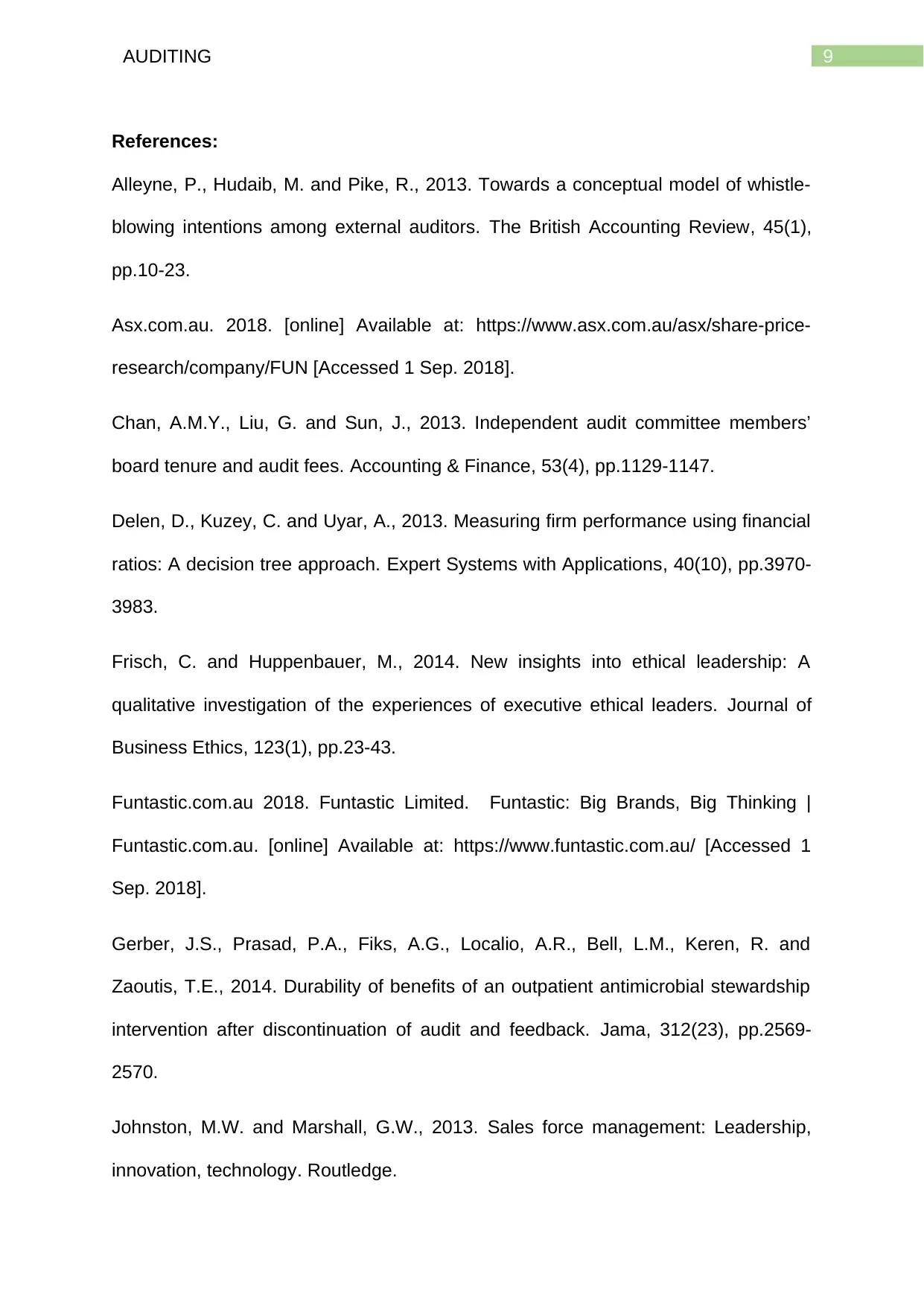
9AUDITING
References:
Alleyne, P., Hudaib, M. and Pike, R., 2013. Towards a conceptual model of whistle-
blowing intentions among external auditors. The British Accounting Review, 45(1),
pp.10-23.
Asx.com.au. 2018. [online] Available at: https://www.asx.com.au/asx/share-price-
research/company/FUN [Accessed 1 Sep. 2018].
Chan, A.M.Y., Liu, G. and Sun, J., 2013. Independent audit committee members’
board tenure and audit fees. Accounting & Finance, 53(4), pp.1129-1147.
Delen, D., Kuzey, C. and Uyar, A., 2013. Measuring firm performance using financial
ratios: A decision tree approach. Expert Systems with Applications, 40(10), pp.3970-
3983.
Frisch, C. and Huppenbauer, M., 2014. New insights into ethical leadership: A
qualitative investigation of the experiences of executive ethical leaders. Journal of
Business Ethics, 123(1), pp.23-43.
Funtastic.com.au 2018. Funtastic Limited. Funtastic: Big Brands, Big Thinking |
Funtastic.com.au. [online] Available at: https://www.funtastic.com.au/ [Accessed 1
Sep. 2018].
Gerber, J.S., Prasad, P.A., Fiks, A.G., Localio, A.R., Bell, L.M., Keren, R. and
Zaoutis, T.E., 2014. Durability of benefits of an outpatient antimicrobial stewardship
intervention after discontinuation of audit and feedback. Jama, 312(23), pp.2569-
2570.
Johnston, M.W. and Marshall, G.W., 2013. Sales force management: Leadership,
innovation, technology. Routledge.
References:
Alleyne, P., Hudaib, M. and Pike, R., 2013. Towards a conceptual model of whistle-
blowing intentions among external auditors. The British Accounting Review, 45(1),
pp.10-23.
Asx.com.au. 2018. [online] Available at: https://www.asx.com.au/asx/share-price-
research/company/FUN [Accessed 1 Sep. 2018].
Chan, A.M.Y., Liu, G. and Sun, J., 2013. Independent audit committee members’
board tenure and audit fees. Accounting & Finance, 53(4), pp.1129-1147.
Delen, D., Kuzey, C. and Uyar, A., 2013. Measuring firm performance using financial
ratios: A decision tree approach. Expert Systems with Applications, 40(10), pp.3970-
3983.
Frisch, C. and Huppenbauer, M., 2014. New insights into ethical leadership: A
qualitative investigation of the experiences of executive ethical leaders. Journal of
Business Ethics, 123(1), pp.23-43.
Funtastic.com.au 2018. Funtastic Limited. Funtastic: Big Brands, Big Thinking |
Funtastic.com.au. [online] Available at: https://www.funtastic.com.au/ [Accessed 1
Sep. 2018].
Gerber, J.S., Prasad, P.A., Fiks, A.G., Localio, A.R., Bell, L.M., Keren, R. and
Zaoutis, T.E., 2014. Durability of benefits of an outpatient antimicrobial stewardship
intervention after discontinuation of audit and feedback. Jama, 312(23), pp.2569-
2570.
Johnston, M.W. and Marshall, G.W., 2013. Sales force management: Leadership,
innovation, technology. Routledge.
1 out of 10
Related Documents
Your All-in-One AI-Powered Toolkit for Academic Success.
+13062052269
info@desklib.com
Available 24*7 on WhatsApp / Email
![[object Object]](/_next/static/media/star-bottom.7253800d.svg)
Unlock your academic potential
Copyright © 2020–2026 A2Z Services. All Rights Reserved. Developed and managed by ZUCOL.




